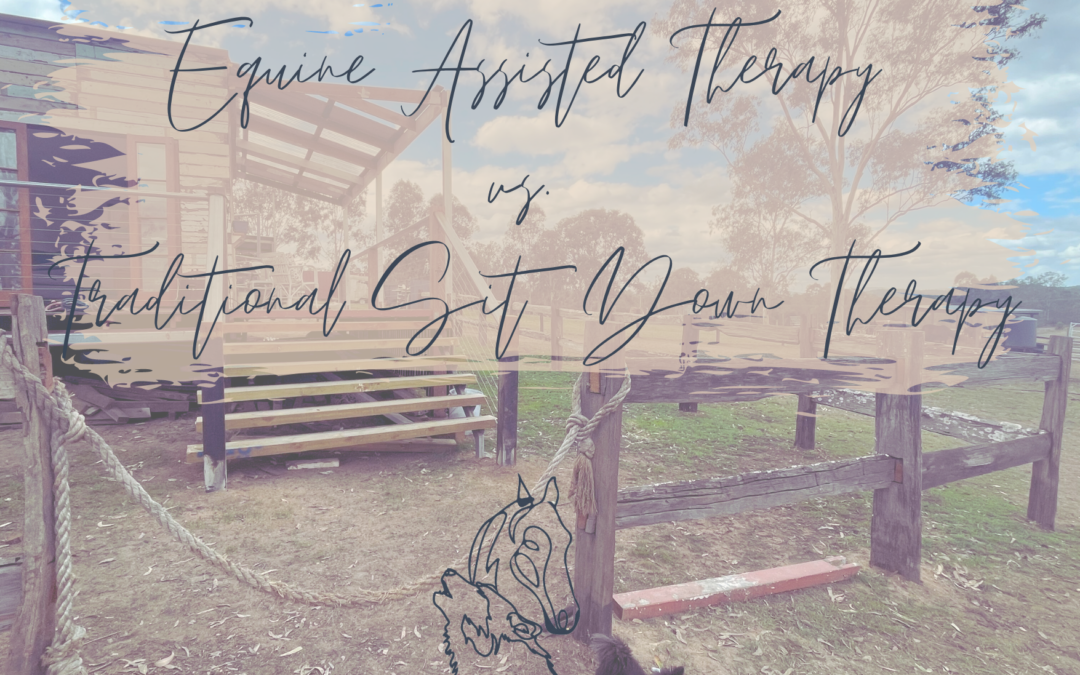In the realm of mental health and therapy, individuals are increasingly seeking alternative approaches to traditional room-based therapy. One such alternative gaining popularity is equine-assisted therapy, where interactions with horses are a key component of the healing, learning or coaching process. In this blog post, we will delve into the benefits of equine-assisted therapy compared to traditional room therapy and vice versa, shedding light on the unique advantages each modality brings to the table.
Equine Therapy: A Breath of Fresh Air
Equine therapy takes therapy sessions out of the four walls and into the natural environment. Interacting with horses outdoors promotes a sense of calmness and connection with nature, contributing to overall well-being. The horses are invited to join the session, and it is through the experiences between the horses and humans in the session that teachable and insightful moments are often found.
Horses are highly intuitive and responsive to human emotions and masters of non-verbal communication. They will often attune to the person in the moment, offering space and safety. Clients often find it easier to express themselves without the pressure of traditional verbal communication and find through the unspoken with the horses, the words they couldn’t find before, begin to arrive.
Our approach to inviting the horses to join our session is based on consent and trust; our herd members know they can say no to joining in a session and, as such, when they join, have willingly chosen to be there. Along with this, we encourage our clients to support their experiences with the horses by establishing a connection with the horses. We do this by using breathing, mindfulness and grounding techniques and demonstrating consent and gratitude-based interactions with the horses. This, in turn, fosters trust between the human and the horse and helps individuals build self-confidence and confidence in their relationship with the horse.
Once these interactions grow beyond the simple introductions, there is a certain magic in overcoming challenges with a large, powerful animal that can translate into increased self-esteem, self-trust and even, for some, a deep sense of accomplishment.
Equine-assisted therapy also encourages individuals to be present in the moment and attuned to their physical and emotional responses. Following traumatic events in life, be they recent or long past, a mind-body disconnect often occurs, so re-establishing this connection is fundamental to growth and healing. Activities such as grooming or intentional touch with the horses can enhance the mind-body connection, promoting mindfulness.
Why the traditional sit-down therapy approach might be for you…
That all said, one may wonder why we have clients who choose outdoor sit down or room-based therapy with us instead…
The first thing here is that horses are not for everyone; some people are not interested in them, find them too overwhelming or simply enjoy the focus of 1:1 sit-down sessions with fewer distractions. Or perhaps the modality of therapy they are seeking (such as Internal Family Systems) isn’t suited to working with the horses.
Traditional sit-down therapy provides individuals with comfort and ease of physical experience. In this approach, the therapists can guide clients through focused interventions that don’t look to incorporate equine experiences and may be an alternative that, for some, offers great space for reflection, journaling, or clarity to focus on their parts.
Therapy rooms provide a controlled space for individuals to explore and express their emotions. The structured setting may be particularly beneficial for those who require a more predictable environment, and, for some, the security of the room feels like a safer way to explore their emotions.
Traditional therapy typically relies more heavily on verbal communication, allowing clients to articulate their thoughts and feelings. For those who are comfortable with language as a means of expression, traditional therapy provides a familiar platform.
The traditional sit-down approach does lend itself to the incorporation of more therapy modalities. This flexibility allows the therapist to adapt their approach based on the client’s preferences and therapeutic goals more easily than when working with the horses. Our team are also Internal Family Systems informed, and the sit-down approach lends itself to this modality more readily than equine-assisted therapy does.
Conclusion:
Equine therapy and traditional room therapy each offer unique benefits, catering to the diverse needs and preferences of individuals seeking mental health support. Whether one chooses the presence of horses and their impact on our mind, body and soul or the more predictable environment and expert guidance of traditional sit-down therapy, the key is finding a therapeutic approach that resonates personally. Don’t forget too – it doesn’t need to be that you can only access one approach. The benefit of a space like Wolf Pack Health and Wellness is that we can vary the approach week by week or by your needs on any given day – you can have the best of both worlds.
Ultimately, the journey towards healing is as individual as the person seeking it, and the choice between equine therapy and traditional sit-down therapy is just one of the many steps towards self-discovery and well-being.
Ready to start your therapy, coaching or personal development journey – drop us a message; we can’t wait to meet you.

